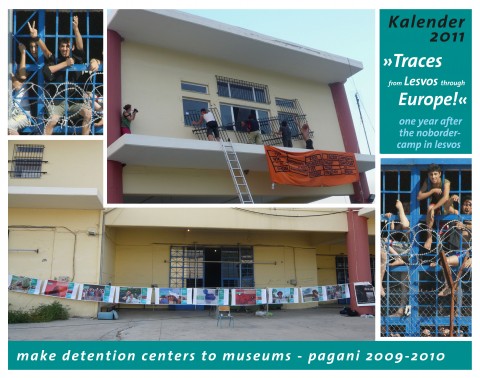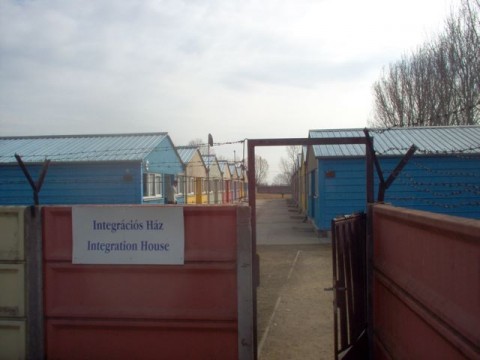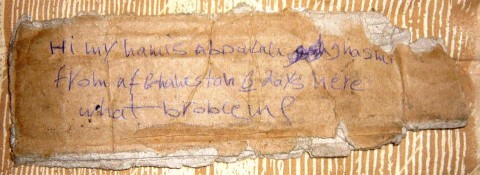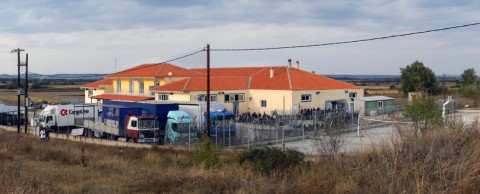Additionally to the Exhibition “Traces … from Lesvos through Europe” a Kalender for the year 2011:

Archive for the 'Locations' Category
Page 4 of 12
17 / 18 December 2010
download report as PDF: Short visit to Hungary_12.2010
 Refugeecamp in Debrecen/ Hungary
Refugeecamp in Debrecen/ Hungary
The following report refers to conversations during a two-day visit to Hungary. Predominantly, we talked to Afghan refugees in Debrecen (reception centre – transfers after the first screening in Békéscsaba or after the end of detention in one of the various detention centres) and in Bicske (camp for unaccompanied minors and recognised refugees), but also to staff of the Hungarian Helsinki Committee. The focus of these conversations was the situation of refugees, deported to Hungary under the Dublin II Regulation – but also the social conditions of refugees in Hungary in general. This was not the first visit to Hungary in which members of the Welcome to Europe Network participated: As a result of the Border Monitoring Project Ukraine (http://bordermonitoring-ukraine.eu/), there have been good contacts also to Hungary for more than two years now. And the Infomobile which has been touring Greece since the summer (http://infomobile.w2eu.net/) also stopped in Hungary on its first tour this summer. So on this trip we made some new contacts, refreshed old ones and met some known faces – and we will certainly come back…
Continue reading ‘Short visit to Hungary: Budapest – Debrecen – Bicske’
The Migrant Solidarity Network in Istanbul is calling for a demonstration on Saturday, the 8th of January in Istanbul, concerning the increasing militarisation of the borders around Turkey. Issues are the to be established Turkish border agency as well as the announcement by the Greek government to build a fence at the land border between Turkey and Greece.
Saturday, 8th of January 2010, 14:00, Galatasaray Square.
Update
Here is a video from the action. Our friends write:
The meeting on Saturday was attended by about 30-35 people. Interestingly enough the attendance of the press was quite impressive. The protest appeared on many mainstream media outlets, paper and virtual.
Here is the call in Turkish:
Continue reading ‘Protest in Istanbul [1 Update]’
On Sunday, 19 December 2010, 12 iranian refugees were arrested by turkish police forces after protests in front of UNHCR’s offices in Ankara. The demonstration was held in order to denounce the refugee agency’s violation of the rights of asylum-seekers in Turkey and was part of an international campaign coordinated by the International Coalition for the Rights of Iranian Refugees (ICRIR).
The refugees’ list of accusations against UNHCR is long. In a call for joint international protests against refugees’ situation in Turkey, ICRIR representatives proclaim deep concern about unprofessional and criminalizing treatment by UNHCR staff, long waiting periods for recognition as refugees, untenable living conditions for asylum-seekers, insufficient protection against violence and abuse by both turkish police and iranian secret agents as well as denial of official refugee status without cause.
Continue reading ‘Iranian refugees arrested during protests against UNHCR in Turkey’
from afghanistan 6 days here what the broblem?
asks young Hamis Abdalah Ghasmi from Afghanistan on a piece of cardboard that was slipped to our delegation in Fylakio. And indeed, it is the question all migrants in detention in the Evros region have in mind: Why am I being kept here?
Yesterday, i.e. Saturday, the 18th of December 2010, saw a mobilisation from the Greek antiracist movement to the Evros region, where most of the border crossings happened the last months and where many hundreds of migrants are being detained under comparably horrible circumstances as in the infamous prison of Pagani.
Our friends from Clandestina alert us to the fact that…
…last Tuesday (4th of December), a riot broke out, one of the most serious to date, at the detention centre at Fylakion in the Evros region, near the town of Orestiada and the FRONTEX headquarters at the Greco-Turkish border. According to the policemen guarding the centre, the sans papiers immigrants short-circuited the electricity network causing a blackout, blocked the sewer system causing the overflow of waste and caused minor damages to the centre’s building.
Special police forces were called in from Orestiada and the sans papiers welcomed them by throwing chlorine detergent at them. They had been supplied bottles of chlorine so that they keep the prison clean by themselves, since no cleaning service is provided for the 3-year old detention centre, where up to 1000 refugees, including families with small children, are being held in a building designed to temporarily host 350 people at a time – with bad water, few toilets, no showers, and no medical or legal help.
During the riot, four sans papiers are said to have escaped.
picture credit: image of Fylakio detention centre taken from wikipedia
…in Greece within the last year:
by Infomobile
- 19th September – 22nd October 2009:
After a number of revolts inside the detention centre Pagani on Lesvos island, the prison was finally officially closed and the last refugees left to Athens. Huge numbers of refugees had been imprisoned in the overcrowded prison all over the summer, leading to repeated uprisings. The refugees demanded freedom through hunger strikes, broke the doors of the cells and put the cells on fire. The revolts gained a lot of public attention and media coverage through the noborder action Lesvos 2009. - 3rd February 2010:
Refugees detained in Venna put fire on their clothes and mattresses to protest against their prolonged imprisonment and the inhuman detention conditions. Only three days later 42 of them were judged penalties of 4-6 months detention and following deportation without having any access to lawyers and interpreters. Then they were transferred to other prisons in order to isolate them. - 13th March:
In the night of 13th March 2010, 35 detainees set the detention centre of the police station of Patras on fire to protest against their detention and the detention conditions. -
13th–17th April:
124 detained refugees started a hunger strike in the detention centre of Samos protesting against the transfer of 60 refugees from Samos detention centre to a prison close to the Bulgarian border and to protest against their deportation
Continue reading ‘Short history of hunger strikes by refugees’
We are monitoring the situation around the upcoming RABIT deployment to Greece. As it seems, Greece has requested 160 175 officers to be sent to Greece.
- Denmark will contribute five to six officers, which will be able to travel within the next four days.
- Sweden will contribute
a handful
of officers. - France has announced to mobilise the entire French RABIT pool.
- Update 2, 4.11.2010:
- Germany has announced to provide up to 40 officers, plus 7 patrol cars and 4 thermo vision vans (source: Sueddeutsche Zeitung, 4.11.2010)
- The Netherlands will send 14 officers of the Royal Military Police (RMP) and 2 officers of the Rotterdam Seaport Police. These 16 will be in action until December 1 and will then be replaced by other Dutch units.
Update 30.10.2010: Frontex released a third press statement. They will deploy 175 border guards and a additional technical equipment:
In total, 175 border-control specialists have been made available by the 26 Member States and Schengen-Associated Countries participating in the first ever RABIT deployment. Joint Operation (JO) RABIT 2010 will also see an unprecedented quantity of technical equipment and other logistical and administrative support. All the costs incurred by Member States in relation to the deployment will be reimbursed by Frontex.
The specialisations of guest officers deployed will include experts in false documents, clandestine entry, first and second-line border checks and stolen vehicles as well as dog handlers and specialist interviewers, debriefers and interpreters. All RABIT officers receive mandatory human rights awareness training as part of their RABIT training by Frontex and in addition, special briefings will be held on the spot as a provision of JO RABIT 2010.
The deployment is scheduled to commence on 2 November 2010, with an anticipated duration of up to two months.
- 1 Helicopter (Romania)
- 1 Bus (Romania)
- 5 Minibuses (1 Romania, 2 Austria, 1 Bulgaria, 1 Hungary)
- 19 Patrol cars (4WD) (7 Romania, 3 Austria, 2 Slovakia, 7 Germany)
- 9 Thermo Vision Vans (2 Austria, 2 Bulgaria, 4 Germany, 1 Hungary)
- 3 Schengen buses (1 Austria, 2 Hungary)
- 3 office units from Denmark
Developing story, we will update this post.
Frontex has granted the request of the Greek government for the deployment of the Rapid Border Intervention Teams in the Evros border.
From their press release (25th of October 2010):
The deployment of European border guard forces at the Greek-Turkish border increases the danger of readmitting refugees to Turkey and from there to their country of origin, where they are put at risk of facing human rights violations. The European Union should meet its obligations and ensure refugees’ protection and well-being.
Greece requested the European Union to send armed so called Frontex Rapid Border Intervention Teams (RABITs) to the Greek-Turkish border. This became public on Monday the 25th of October 2010.
Greek government statistics state that irregular migration has been increasing in the Evros-Region where the land broder to Turkey stretches over 12 km. According to the Greek Minister of Citizens’ Protection Christos Papoutsis only during the first October weekend of this year 1,400 refugees have been intercepted in that region.
Continue reading ‘Frontex Rapid Border Intervention Teams to patrol the Evros border’





